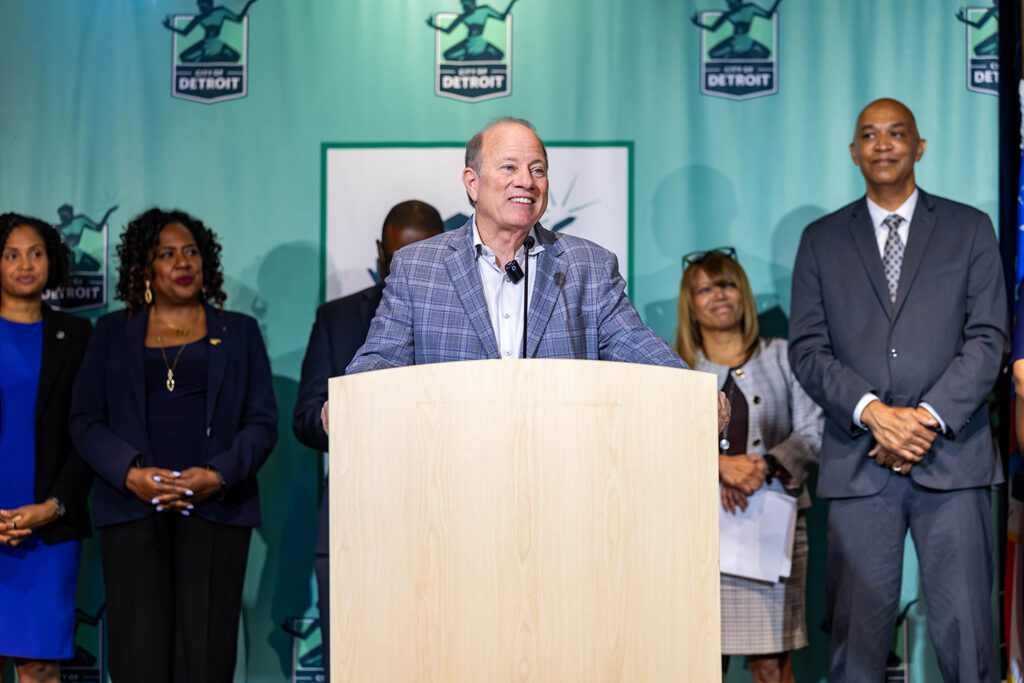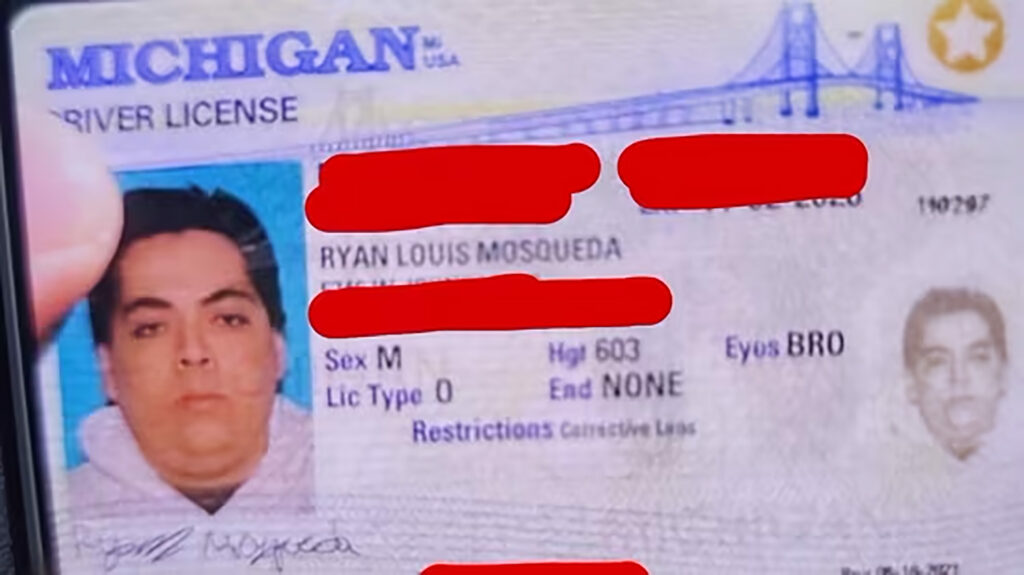At the exact moment Jocelyn Benson was planning a run for governor, a Chinese national voted on her watch, and that vote counted.
Text messages after the illegal vote show Benson scrambling unsuccessfully to get data to defend herself, pursuing a harder public line than the facts would support, and approaching the people’s work with partisan concerns.
Benson Has Little Access to Voting Data
Not even Jocelyn Benson, the secretary of state herself, can get ready access to accurate election data.
“I need to know the number of active registered voters who don’t have a license or ID affiliated with their record,” Benson texted four of her subordinates on Oct. 28, 2024. “And if possible we need to know the number in that universe who voted in 2020. Just for raw data right now please.”
Benson knew what had happened in Ann Arbor—a Chinese national named Haoxiang Gao participated in early voting—and was trying to determine the possible scale of the problem.
What came back from aide Tina Anderson is what the average person might expect after filing a FOIA: Anderson told Benson the data set is so big as to be unhelpful.
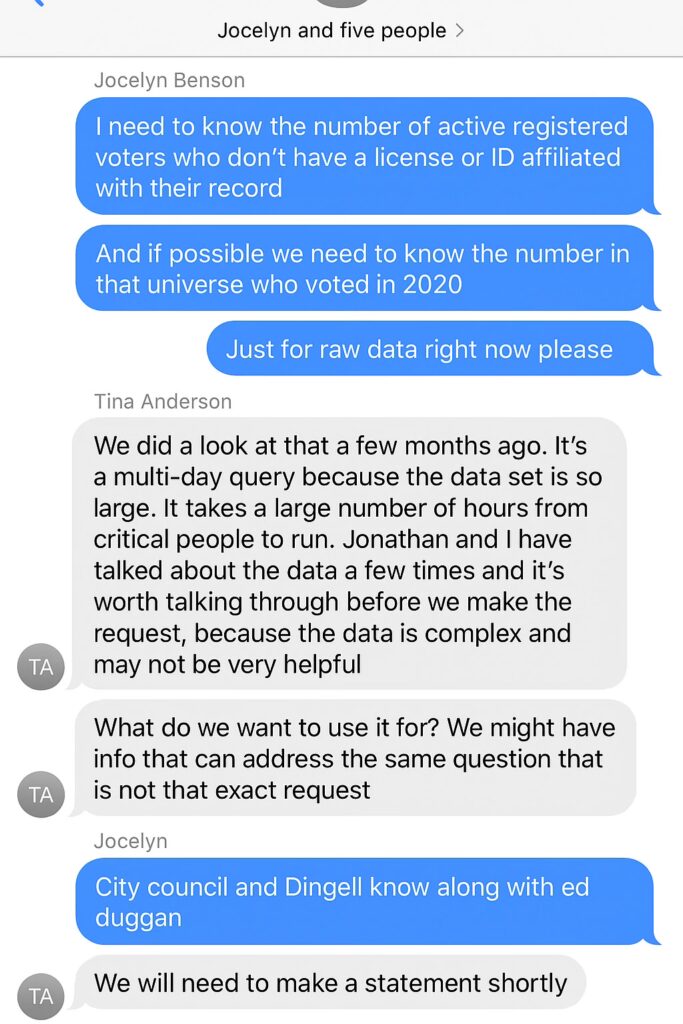
“We did a look at that a few months ago,” Anderson wrote. “It’s a multi-day query because the data set is so large. It takes a large number of hours from critical people to run. Jonathan and I have talked about the data a few times and it’s worth talking through before we make the request, because the data is complex and may not be very helpful.”
Anderson responded to Benson’s questions with more questions.
“What do we want to use it for?” Anderson asked. “We might have info that can address the same question that is not that exact request.”
“Need to be able to say the vast majority of voters [register with] an ID or DL and have a number to go with that,” Benson responded.
The exchange indicates three things about Benson’s grasp of the office she has held since 2019:
- Benson does not have top-of-mind knowledge of the numbers pertinent to her work.
- She cannot get the numbers by asking top aides.
- Although Benson did not have a complete understanding of the situation in Ann Arbor, she knew what she “needed to say,” even if the facts didn’t support her claim.
“Need to get the number and not debate this please [right now],” Benson texted. “I appreciate we are a team that loves to deliberate but we don’t have time for that now.”
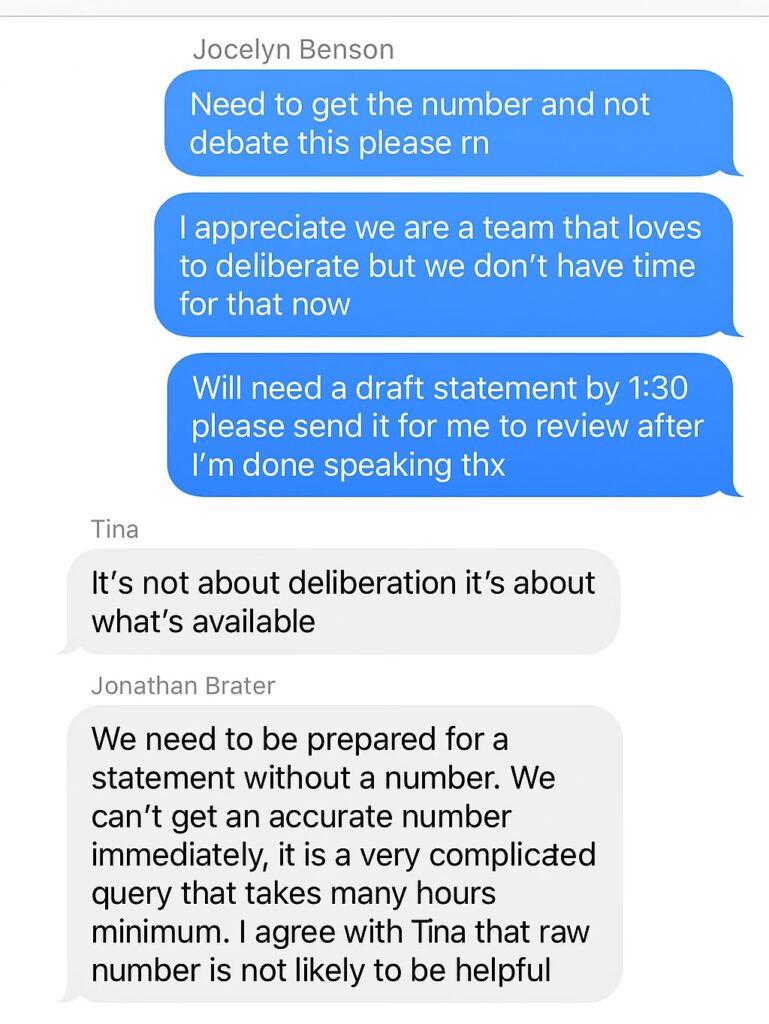
In the end, Benson never did get that number, and eventually let her team off the hook.
“Number doesn’t need to be in statement,” Benson said. The eventual Oct. 30 press release contained no such data.
Pushing a False Law-and-Order Narrative
Without numbers, Benson’s focus shifted to the narrative. In the face of a known voting breach in a swing-state presidential election, Benson wanted to tout the deterrent factor of the law. Even though that had failed to deter the Chinese voter.
“[Attorney General] Dana [Nessel] and I talked earlier also want to weave in—you’re going to see significant consequences unfold for this gentleman, that should be a deterrent,” Benson added.
Benson’s statement is an admission. Since illegal voters are not stopped on the front end in Michigan, the only hope is that they will be caught and prosecuted. Which is to say, if someone is willing to do the time for voter fraud, they can do the crime.
But the heart of security is disallowance, not deterrence. Because Michigan election law does not disallow non-citizens from registering and voting, Benson’s only defense, and only argument against reform, is that punishment will be enough.
As Benson urged talking points that vowed “if you try this you will be caught,” Tina Anderson urged caution. It would be too strong to say “you will be caught,” Anderson warned.
Neither Benson nor the Ann Arbor city officials had caught anybody. Gao self-reported his illegal vote, like a guy calling a foul on himself in a YMCA pickup game.
Anderson’s argument won the day. Her words were the kicker in the Oct. 30 statement.
Anderson wrote, and Benson later repeated: “Let this be a message: Voting records are public—any noncitizen who attempts to vote fraudulently in Michigan will be exposing themselves to great risk, and will be prosecuted to the fullest extent of the law.”
As Anderson explained, “Rational [sic] is if we say ‘will be caught’ we could invite questions about how this was uncovered.”
Had Gao not told election officials about it himself, they might never have found out. They wouldn’t have had reason to check. Benson could have gone on treating non-citizen voting as if a conspiracy theory.
Pressure From Debbie Dingell
One Benson aide asked if the release should be “proactive,” or initiated by Benson’s office, or “reactive,” waiting for a media query to arrive before responding.
Throughout the exchange that day, Congresswoman Debbie Dingell’s awareness of events was treated as a ticking clock. Benson’s team never says how Dingell got looped in on the illegal voter, but Dingell’s congressional district does cover Ann Arbor.
“It will get out,” one Benson aide warned.
“At this point, I think we should be proactive,” said aide Aghogho Edevbie. “We’re down to hours, possibly minutes before there’s broader awareness. With the council and Dingell knowing, it will get out. It’s best if we speak first.”
No media inquiries had arrived just yet, aide confirmed, “but a lot of people know about it,” Anderson warned.
When it came time to issue a statement, Benson struggled to find co-signers. Benson aide Angela Benander spoke to the staff of AG Nessel and Ann Arbor City Clerk Jacqueline Beaudry about issuing a joint statement. Neither bit.
“Why don’t they want to join us?” Benson asked her team. “I just spoke with Jackie and she did not seem happy about us putting out a statement.”
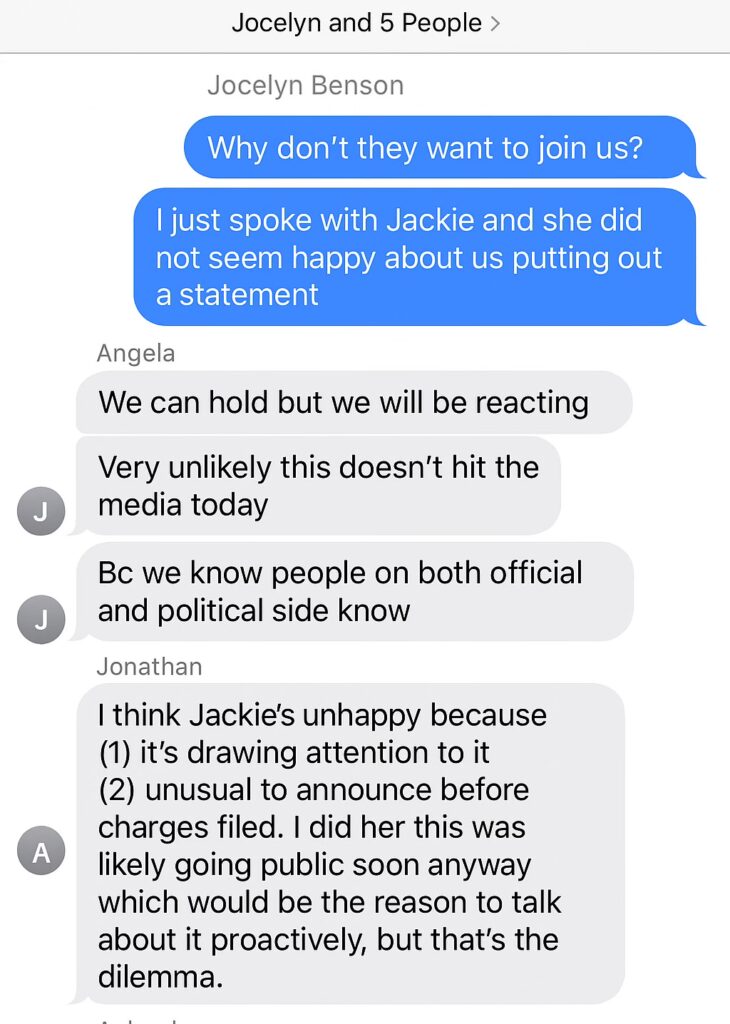
“I think Jackie’s unhappy because (1) it’s drawing attention to it (2) unusual to announce before charges filed,” explained aide Jonathan Brater.
Again, Dingell was cited as a contributing factor.
“1) Debbie Dingell announced it to everyone,” Benander texted, “2) these are unusual circumstances.”
It was Benson herself who made a joint statement happen.
“I would like any proactive statement to be made jointly with the clerk or local prosecutor. So let’s work on developing that,” Benson texted.
Then she added: “I spoke with Eli. He and I will issue a joint statement when he’s ready.”
That statement was released on Oct. 30, after Savit filed charges against Gao.
In a separate text with Brater on Oct. 28, Benson said: “Just wanted to raise that someone could’ve asked or paid this person to do this and we shouldn’t assume that’s not the case.”
Spinning the Media
When Benson looked for a place to tell her story, aide Cheri Hardmon attempted to get her a segment on “Off the Record” with Tim Skubick, a public affairs show shot in Lansing.
That effort failed because of timing and proximity to the election. Skubick told Hardmon that “for the sake of maintaining a nonpartisan atmosphere this week, he isn’t having any elected officials on.” Hardmon said she pitched the segment as one about “early voting and election preps.”
Hardmon never told Skubick that Benson would offer a scoop. When it came time to tell the story of the illegal voter in Michigan, that scoop was guided to the Detroit News, where the illegal vote was portrayed as an “extremely rare and isolated event.”
Six months later, when Benson’s review found that the isolated event had happened a minimum of 16 times, that scoop was guided to the Detroit News also. Aping Benson’s talking points, the second paragraph of that story attempted to minimize the scale of the findings.
“The findings, released Thursday to the Detroit News, indicated the potentially illegal votes represented less than 0.0003% of the 5.7 million total ballots submitted,” read the story.
Benson couldn’t have written the line any better herself. In a sense, she did write it herself.
You can read the full FOIA from the Michigan secretary of state here.
Anna Hoffman is a hockey mom of three living in Ann Arbor. Follow her on X @shoesonplease.
James David Dickson is host of the Enjoyer Podcast. Join him in conversation on X @downi75.


